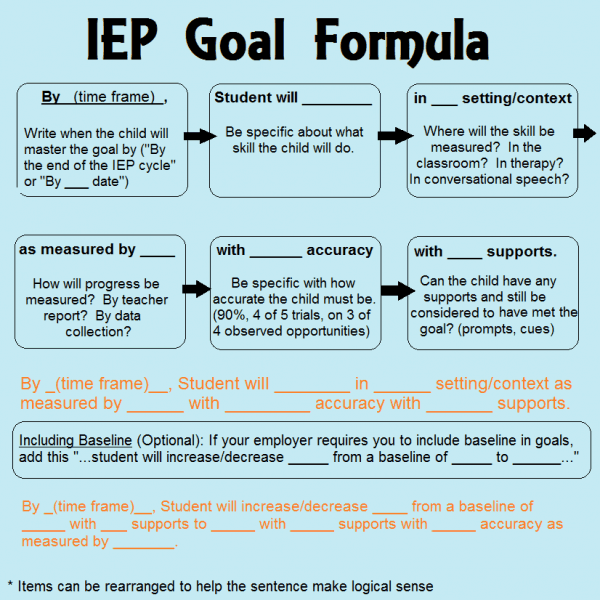25 Measurable Telling Time IEP Goals
Telling time is an essential executive function that our kids need to live independently. Of course supports and accommodations can be put in place, but it will be very difficult for anyone to live on their own without the ability to tell time.
Telling time is considered a math skill. Telling time IEP goals will likely fall to the math teacher or special education teacher as far as supporting it.

But, it has such a huge executive functioning component to it that shouldn’t be overlooked.
Telling Time
Telling time refers to the ability to determine and express the current time using a clock or other timekeeping device. It involves understanding the concepts of hours, minutes, and seconds, as well as the divisions of time such as AM (ante meridiem, before noon) and PM (post meridiem, after noon) in a 12-hour clock system, or the 24-hour clock system used in some countries.
Download PDF: https://adayinourshoes.com/wp-content/uploads/2024/02/Learn-To-read-Time.pdf
Telling time typically involves several skills:
- Reading Analog Clocks: This involves understanding the positions of the hour hand and minute hand on a traditional clock face to determine the time.
- Reading Digital Clocks: This involves interpreting the numerical display of hours and minutes on a digital clock or electronic device.
- Understanding Time Intervals: This involves grasping the concept of how time progresses in intervals, such as counting by hours, minutes, or seconds.
- Recognizing Time Formats: This includes understanding different time formats, such as the 12-hour clock system commonly used in the United States and the 24-hour clock system used in many other countries.
- Relating Time to Daily Activities: This involves understanding the relevance of time to daily routines, schedules, and activities.
Learning to tell time is an important life skill that is typically introduced and reinforced during early childhood education. It is important for daily functioning, as it enables individuals to coordinate activities, manage schedules, and understand the passage of time.

Student Cannot Tell Time
If an individual struggles with telling time, they may encounter various difficulties in daily life. Here are some potential challenges:
- Difficulty Managing Schedules: Without the ability to tell time, it can be challenging to manage daily schedules and appointments, leading to missed meetings, events, or deadlines.
- Impaired Time Management: Difficulty telling time can hinder effective time management skills, resulting in poor allocation of time for tasks and activities.
- Dependency on Others: Individuals who cannot tell time may need to rely on others to inform them of the time, which can limit their independence and autonomy.
- Difficulty Following Directions: Many instructions and tasks are time-dependent. Difficulty telling time may lead to challenges in following directions or completing tasks that require adherence to specific timeframes.
- Increased Stress and Anxiety: Not being able to tell time accurately can lead to feelings of stress and anxiety, especially in situations where promptness or timeliness is essential, such as in school or at work.
- Social Isolation: In social settings, not being able to tell time may lead to difficulties in coordinating plans with others or participating in time-sensitive activities, potentially resulting in social isolation or exclusion.
- Academic Challenges: Telling time is often a foundational skill in early education. Difficulties in this area may impact academic performance, particularly in subjects that require understanding of time concepts, such as mathematics or science.
- Safety Concerns: In situations where timing is critical for safety, such as catching transportation or administering medication at specific intervals, not being able to tell time accurately can pose safety risks.
- Limited Employment Opportunities: In the workplace, accurate time management is often essential. Difficulties in telling time may limit employment opportunities or hinder job performance.
- Reduced Independence: Overall, the inability to tell time accurately can impact various aspects of daily living and may contribute to reduced independence and quality of life.
Telling Time IEP Goals
If it was my kid or my client, these are the telling time IEP goals I think are most important for independence. These are essential for a successful job or postsecondary education, or anything where time will be measured, monitored and will determine the student’s success.
Here are five Individualized Education Program (IEP) goals for telling time:
- Analog Clock Reading: By [specific date], the student will accurately read and interpret the time displayed on an analog clock to the nearest hour, with at least 80% accuracy over five consecutive sessions.
- Analog and Digital Clock Conversion: By [specific date], the student will demonstrate the ability to convert between analog and digital time representations, accurately translating the time shown on an analog clock to the corresponding digital format, and vice versa, with at least 80% accuracy over five consecutive sessions.
- Telling Time to the Nearest Five Minutes: By [specific date], the student will accurately tell time to the nearest five minutes using both analog and digital clocks, with at least 80% accuracy over five consecutive sessions.
- Elapsed Time Calculation: By [specific date], the student will calculate elapsed time between two given points in time (e.g., determining the duration of an activity or event) using both analog and digital clocks, with at least 80% accuracy over five consecutive sessions.
- Application of Time Concepts: By [specific date], the student will apply time-telling skills in real-life contexts, such as scheduling daily activities, planning appointments, or coordinating events, demonstrating independent time management skills with at least 80% accuracy over five consecutive instances.
IEP Goals for Telling Time
As always, put the specific skill and the student’s specific information into the IEP goal formula to make any skill or task measurable.

- Identify and name specific times of day (morning, afternoon, and night) and match the time of day with appropriate activities.
- Identify and name the days of the week.
- Identify and name the months of the year.
- Identify and name the current day and date.
- Identify and name the current season and the other seasons in sequence.
- Identify his or her birthday and birth date.
- Identify and name the major holidays.
- Identify and name clocks and watches.
- Identify and name the time by the hour and half-hour on different types of clocks and watches (digital, wrist, numeral, etc).
- Match time on a digital and analog clock.
- Explain the 24-hour time system, able to understand both 12 and 24 hour times.
- Read time on an analog clock or watch.
- Use appropriate labels such as second, minute, hour, day and know which is longer or more.
- Be able to add time; IE-if it’s noon and someone tells them “Call me in 2 hours” they will get the correct time.
- Be punctual to school, leisure time, and other appointments and scheduled activities.
Remember that I have dozens of lists of IEP goals on this site, if this list of Telling Time IEP goals does not meet your needs.
Math IEP Goals
- 68 Money IEP Goals including Functional Math and Budgeting
- 25 Telling Time IEP Goals
- Math Word Problem Solving IEP Goals: 12 Examples and Objectives
- 68 Money IEP Goals including Functional Math and Budgeting
- 29 Math Problem Solving IEP Goals (Including Math Reasoning)
- 50 Math IEP Goals, including Calculation and Computation
- Kindergarten Math IEP Goals
Don’t miss all the other “timely” information I have here on this site. See what I did there?
Time After Time
- 25 Measurable Telling Time IEP Goals
- 9 Free Telling Time Worksheets (PDF)
- 6 Signs to Tell if you Have Time Blindness and How to Manage It
- 10 Best Visual Timers for Kids for Home or Classroom
- Telling Time Clock Worksheets



